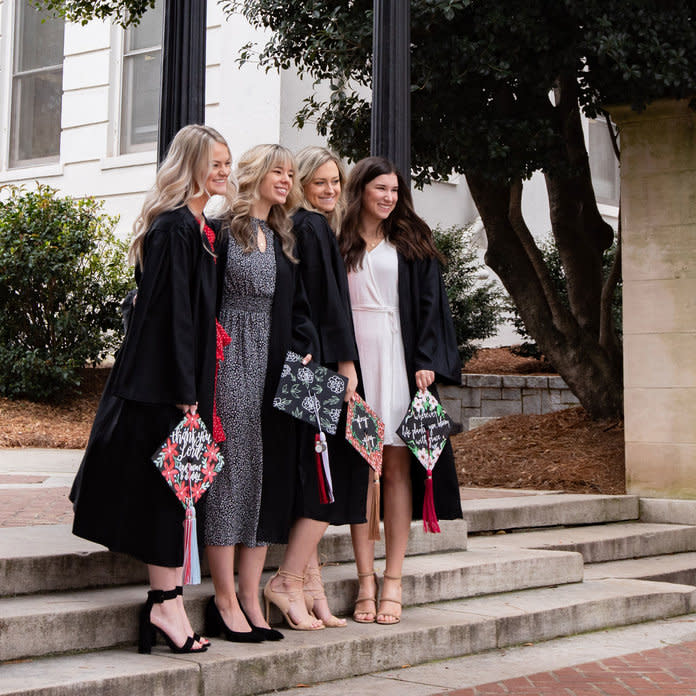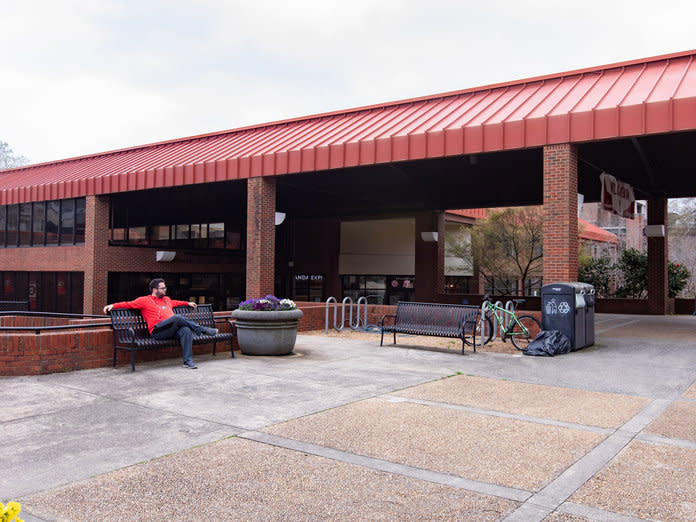A Haunting Look at College Life Post-Coronavirus
Last year, I spent my 21st birthday crying into my pillow in a dorm room in Spain. I’d been studying abroad and living my best life, having spent the previous night partying in a cave-turned-club, when one text from a friend back home sent my joy screeching to a halt: There were reports of an active shooter at my school, the University of Michigan. I immediately logged onto Twitter, where I was bombarded with photos of my peers barricading in their library study rooms, accompanied by imprecise reports of the alleged gunman’s whereabouts. I called my mom, who had no idea what was going on, and I cried. The situation turned out to be a false alarm, but the trauma it dredged up remains.
This month, I spent my 22nd birthday practicing social distancing and pretending a pandemic hadn’t just ended my senior year of college.
On Wednesday, March 11, my university officially canceled in-person classes for the rest of the semester, following the lead of hundreds of other schools nationwide, spanning from New England to Texas. The announcement came a day after Governor Gretchen Whitmer declared a state of emergency in Michigan due to two confirmed cases of the novel coronavirus within our borders. All university-sanctioned events with expected attendance of over 100 were called off until April 21. For a few days, I held out hope that our commencement ceremony would still take place this May, but it has since been canceled, too.

Like everyone else who started college in the fall of 2016 and will receive their degree this spring, my undergrad experience has been dogged by insurmountable tragedy. Our four years of study sit sandwiched between Donald Trump’s election to the presidency and the escalation of COVID-19, punctuated throughout with mass shootings and sexual assault cases on our campuses and beyond. We started school as our nation entered a state of political, economic, and emotional uncertainty, and it looks like we’ll be ending on a similar note, this time on a global scale.
As of now, I’m still living in my off-campus apartment, but I’ve struggled to keep track of which of my friends are still in town and which I might never see again. Some students are in denial and continue to gather in their yards for casual drinking. The weekend before Saint Patrick’s Day, I watched groups of girls come and go from fraternity parties sporting matching hoodies that read “Kiss Me, I’m Corona Free.” Meanwhile, the yoga studio where I worked as an instructor has closed, and I’ve been left wondering whether the class of 2020 will have any job prospects at all when we graduate.
How are college students supposed to focus on schoolwork when every aspect of life right now seems up in the air? For most of us, paying attention to online classes is the least of our worries.

Job loss has been a primary source of concern. Jamie Lawrence is a fourth-year student at Pennsylvania’s Chatham University set to graduate this December. “When [the NCAA] announced that all spring sports were canceled, that kind of meant my job,” says Jamie, who worked 15 to 20 hours a week as game staff at her school’s arena. Within the week, the hours of her second job as a waitress were reduced substantially, given the state’s ban on dine-in service. “Technically, we still need one server there every day to ring in the delivery and takeout orders, but we have 20-some servers.” She doubts any one of them will be making enough to get by.
“With the rumors going around that this could last however long, I might start to struggle,” she says; she will likely leave campus to stay with her mother, an hour-and-a-half drive away.

Of those students who have successfully left campus, many did so with health worries weighing heavily on their minds. Austin Hodge, a freshman at the University of Pittsburgh at Greensburg, recently returned home to his mother and grandmother; his mom is at an elevated risk to COVID-19, the disease caused by the coronavirus, because she’s been diagnosed with multiple autoimmune disorders including Graves’ disease. “My biggest fear is my mother contracting [COVID-19] because it takes her two to three times as long to battle a common cold,” he says. “If she contracted it, she would die. There’s no ifs, ands, ors, or buts. She just wouldn’t survive, and that’s my worst fear,” he says.
Beyond the immediate stress of navigating a pandemic — uncharted territory for most Americans — Austin tells me sacrificing his newfound college independence has been salt in the wound. “I was functioning on my own, I was ‘adulting,’ for lack of a better word, but now that all this has come around, I kind of had to give that up,” he explains. “I’m willing to give that up, but I think it’s kind of sad that I had to.”

Coronavirus has no regard for borders, race, religion, or gender. It doesn’t care that you’ve been working toward a bachelor’s degree for the past 16 years or that you might not be able to pay this month’s bills. It won’t apologize for endangering the lives of your loved ones. As Ashira Chugh, a senior at the University of Michigan puts it, “Once it sees, it just attacks.”
Amid all the horrific loss for which it’s responsible, COVID-19 may have also handed college students a gift (albeit one we didn’t ask for): time. While cooped up in our apartments, houses and dorm rooms, we’ve been forced to ruminate on the aspects of our lives that might have seemed unremarkable just a few weeks ago. “It’s kind of a humbling situation,” says Ashira.
Just a month ago, the street I live on was a hotbed for typical college debauchery, full of students drunkenly hopping from one house party to the next no matter the night of the week. It bothered me then, but the area was home to a hum of constant noise coming from thudding stereo systems, giggling groups of friends leaving the nearby liquor store, and absurdly competitive beer pong matches. Over the past two weeks, it has all but gone silent.

There’s a special kind of physical closeness that comes with living on a campus, and it shapes virtually everything about the college experience. For four years, we live in tiny dorms and apartments with the structural integrity of a cardboard box, often alongside people we’ve only recently come to know. We make new friends, and we share with them everything from secrets to clothes to sips from a Solo cup. Every day, we crowd into carpeted lecture halls by the hundreds which haven’t been renovated since the ‘90s. We study at coffee shops and on blankets in the quad when the first signs of spring start to show. When the sun goes down, we cram our sweaty bodies into grimy clubs and frat basements that would send our parents reeling. We discover our sexual preferences and make a lot of mistakes along the way. We do a whole lot of touching, and through it, we learn who we are, and what we like and want out of life.
Suddenly, our time is up. College students have gone from a life of constant closeness and touch to the opposite end of the spectrum. COVID-19 has forced us to recognize the temporality of our circumstances; one moment, we’re surrounded by love and chaos and bodies, and the next, nothing.
What are a bunch of 18- through 22-year-olds doing with their free time? We’re moving through each day in many of the same ways as the rest of the world. We’re crocheting, playing board games, and sharing pictures of homemade bread on Instagram. We’ve hopped on the Tik Tok bandwagon, learning from our younger counterparts how to do viral dances like no one is watching. Kids like Austin have found solace in the solidarity of social media. “The Internet has been extremely active because of all this, so I’ve been able to keep in touch with people, but losing those real, in-person interactions, it’s been upsetting,” he says.

Caroline Head
We aren’t all just reeling from a break in our American university escapades. For international students like Ashira, the coronavirus has sent immigration plans into question, leaving them stranded continents away from family. Though Ashira was born in India, her family now resides in Kuwait. Her university has advised all students to return home, but Ashira couldn’t go home even if she wanted to. In response to coronavirus flare-ups throughout the Middle East, Kuwait has imposed a complete travel ban until March 26. “My parents are trying to see, ‘Oh, what if you come back on the 26th of March?’ But at this rate, who knows what’s going to happen?” She says. “For other international students, for a lot of the ones I’ve been talking to, it’s like, what do we do? Where do we go?”
RELATED:
5 Women on What It's Like to Have an "Essential" Job During the Coronavirus Pandemic
6 Coronavirus Myths You Should Know About, According to Experts
If You Usually Pay Someone to Work For You — Keep Paying Them
Returning home could also cost Ashira the post-graduate job she’s worked so hard to secure. “The problem is, I most likely won’t even be able to leave because one of my work visas is being processed,” she explains. “Leaving, I would risk re-entry. I would risk not being able to come back. It’s not like [immigration services] cares that coronavirus is happening.”
Through everything, I’ve done what I can to approach this moment in history as the ultimate life lesson. I am incredibly lucky to reside in my home country, to be healthy and able-bodied. I’m still receiving a world-class education online, and I have everything I could ever need at home. I’ve maintained relative contact with the people I love and who love me. Social distancing isn’t the ideal way to spend a 22nd birthday, but I did it to ensure that as many of us as possible will have years of celebration to come.

